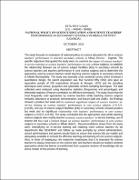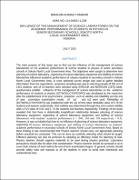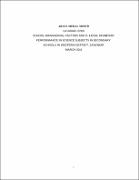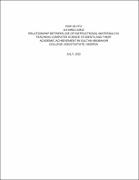| dc.description.abstract | ABSTRACT
The study focused on evaluation of national policy on science education for all on science teachers’ performance in selected secondary schools in Mbale District – Uganda. The specific objectives that guided the study were; to establish the impact of science teachers’ in service training on science teachers’ performance on core science subjects; to establish the relationship between use of science subject facilities (kits) in secondary schools by science teachers and teachers performance in core science subjects and to determine the approaches used by science teachers while teaching science subjects in secondary schools in Mbale Municipality. The study was basically cross sectional survey which involved a quantitative design, the parent population was five hundred fifty (550) who gave an equivalent sample of 226 respondents (Krejcie & Morgan, 1970) and the sampling techniques were census, purposive and systematic random sampling techniques. The data collected were analyzed using descriptive statistics (frequencies and percentages) and inferential statistics (Pearson correlation co-efficient techniques). The study found that the most frequently used approaches by science teachers while teaching science subjects included, laboratory or practical, demonstration, and lecture (talk and chalk); the findings showed a positive but weak and no statistical significant impact of science teachers’ in-service training on science teachers’ performance in core science subjects (r=0.325, p>0.05); and use of science subject facilities (kits) in secondary schools showed positive but weak and no significant relationship with teachers’ performance in core science subjects (r=0.074, p>0.05). The study concluded that the approaches used while teaching science subjects were mainly teacher-centered; science teachers’ in-service training, use of science kits have had a limited impact on science teachers’ performance in core science subjects in secondary schools in Mbale district. Recommendations drawn from the study were; intensifying on in-service training and retaining more science teachers by set departments like SESEMAT and follow up made promptly by school administrators; school administrators and parents should liaise to ensure that science kits are readily and adequately available in schools for effective teaching and learning of core science subjects. Also, in times of inadequacy, the researcher emphasizes that it is important for science teachers to always improvise on the science kits; and teachers should use student-centered approaches where the learner is transformed from a passive receiver of knowledge into an active creator of the process of learning. | en_US |




